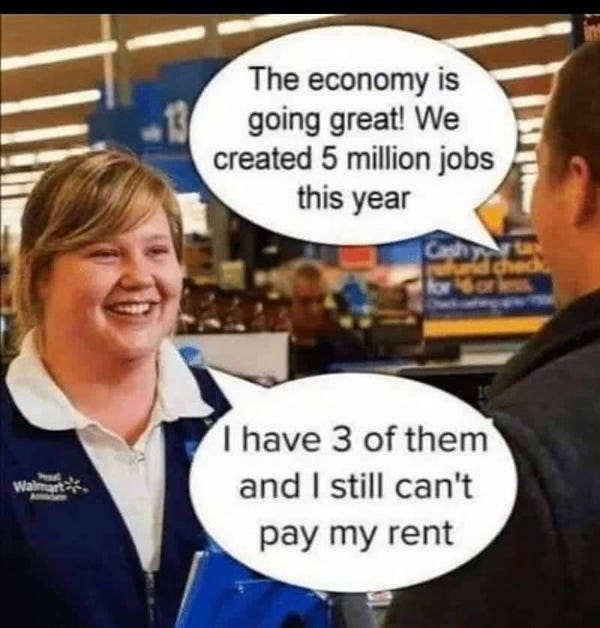How Does the Creator Economy Derive the Future of Work?
That is how we're getting work in the future
GM, I’m Shreya 👋
And this is Crypto Creatives. Every Thursday, you get one of the following:
An atomic essay
Opportunities for creators in Web3
News about the Web3 Creator Economy
If you’re excited to be a part of the upgraded Creator Economy, welcome home!
The Creator economy has become bigger than the gig economy. Side hustles have become way more common than they were ever before.
Everyone’s trying to build a passive income; employees are Quiet Quitting, and thousands of new are joining the creator economy.
The renaissance of art is shaping how we work and corporations hiring process.
My Instagram feed helped me get my last job as a marketing designer. Nobody bothered about the CV I spent 3 hours perfecting.
Companies are hiring differently now. The creator economy has changed how we look at talent.
Whether you’re looking for a brand to sponsor you, a gig, or a full-time role, — it has become more decentralized.
Here’s how the creator economy is deriving the future of work.
Proof of work
A CV could have gotten you a new job 4–5 years ago, but people want to see your work before they move forward with your application.
Proof of work has become the most critical factor in lending a gig. The concept of “don’t tell, show” has not gone real.
Proof of work >>>> College degree
A college degree and a strong LinkedIn profile may not give justice to showcasing your talent, but your proof of work does precisely that.
For creators and digital entrepreneurs, your proof of work is how you’re judged and paid.
This proof of work could be
A blog that showcases your writing skills
A YouTube channel showing your expertise (tech, makeup, fashion, camera confidence, design, scripting, etc)
A dApp showcasing your coding and entrepreneurial knowledge
Social media accounts
Depending on the role you’re applying for, this is subject to change.
Whether you apply to a Web 2 company or a web3 company, proof of work will be non-negotiable.
Your audience size matters
If you have proof of work (POW) and the required skill set, do companies care about how many followers you have?
Yes, they do.
When working with influencers, brands go with influencers with bigger audiences for better conversion rates.
If you are applying for a role in marketing, your audience size will be your POW.
Companies are now more focused on their brand image than ever before. They are hiring ambassadors more than employees. A bigger audience will mean a bigger network to get free publicity. Your audience adds extra points in such cases.
Why would a designer be judged for how many followers she has on Quora? Well, I was wrong. In my first job interview, the CEO was more interested in how I built the audience and what I wrote about.
Companies are no longer hiring employees they are hiring brand ambassadors.
Guess what? Size does matter, even in hiring for a part-time or full-time creator.
DAOs & communities you’re part of
Communities are more important than fans. Fans come and go, but communities stay.
They create network effects that last longer than the content or the product. Companies understand this.
They want people who not only build BIG communities but also are part of some.
Being a part of a community means
You’re good with people and have a good network
You’re excited about things other than your job
You have the knowledge of what’s happening in the market
And you’re contributing member of a DAO or other community
This makes you an asset for companies building in a creator economy and wanting to understand the market and how to create a strong subculture using your knowledge.
Brands have their “type”
“What your type?”
We are moving to an era where what our type is no longer valid to people we date. It has been replaced by Content Type.
Your content type must match the company to land a deal/job. Be ready to answer the following
Are you a video person?
Are you a reel creator?
Do you prefer words or visuals?
Do you like a blog or a carousel?
Your content type will matter greatly when you’re looking for sponsors or a full-time role. Companies will hire people that match their content type even when it’s as niche as video essays or collages.
Consultants on the go
Companies need marketing. Marketing is content. Content needs creators. Creators need work. It’s the same cycle we’ve been living for years.
The only thing that has changed is now we’re charging for things we love to do, and companies are paying for us that.
They want you to make them look fun on LinkedIn.
They want you to make them look quirky on Instagram.
They want you to make them look Interesting on YouTube.
They will either hire you full-time or get a consulting session with you. Consulting will cost them less and save you from doing the groundwork.
Content Consultants are already taking over social media, some examples are Justin Welsh for LinkedIn and Ali Abdaal for YouTube.
With millions leaving their jobs, companies are opening up to more part-time roles.
Your consultation will be “your expertise.”
Parting thoughts
Companies are taking creators seriously and creating roles for creators. A new model is forming where the creator fully controls their creative work. This new world allows them to be themselves and let the brand change their narrative for them.
Remember the Charlie campaign from Nike? That was just the start.
With creator economy and marketing requirements, creators are running the wheel of capitalism. You’re content and knowledge will help you build a solid prospectus for companies looking to attract more eyeballs.
When they don’t have the resources to build a community, they’ll collaborate with you to leverage your community.
When they do, they will look for the things we discussed above.
Being a creator and having a community is the new wealth magnet.
What other areas do you think the creator economy is changing? Tell us in the comments 👇🏻
Meme of the week
For daily updates, follow us on Twitter.





